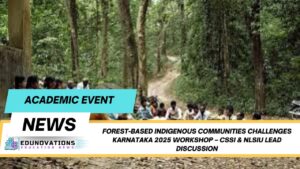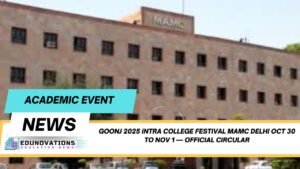Azim Premji University Bengaluru celebrates the Coastal and Marine Ecosystems Festival Oct-Nov 2025 through exhibits, workshops, and cultural performances that raise awareness about India’s seas and coasts.
A Celebration of Coastal and Marine Ecosystems
Bengaluru, October 2025 — Azim Premji University has brought together scientists, artists, educators, and students to celebrate India’s vibrant coastal and marine heritage through a two-week event titled the Coastal and Marine Ecosystems Festival Bengaluru Oct-Nov 2025.
The festival, themed “Coasts & Oceans of Life,” explores the complex relationship between humans and the marine world, promoting sustainable practices and environmental stewardship through art, research, and community engagement.
This initiative is part of the university’s continued effort to strengthen public understanding of marine biodiversity, coastal livelihoods, and the urgent need for collective climate action.
The Festival’s Vision: Connecting Communities to the Sea
India’s coastline extends more than 7,500 kilometers, supporting millions of people whose lives depend on marine ecosystems. The Coastal and Marine Ecosystems Festival Bengaluru Oct-Nov 2025 aims to highlight this interconnection by bridging academic research with public participation.
The festival showcases the diversity of India’s seas through student-led research exhibits, immersive installations, and interactive storytelling sessions. Each segment offers visitors a glimpse into the hidden treasures of marine life and the challenges posed by climate change, pollution, and unsustainable fishing.
According to Dr. Radhika Menon, a renowned marine ecologist and visiting faculty member,
“Events like this encourage young minds to see the ocean not just as a distant space, but as a living system that sustains communities and culture.”
Exhibits and Installations that Bring Oceans to Life
At the heart of the festival lies a series of immersive student research exhibits on India’s coasts and oceans, created by learners from the School of Development and Environment Studies. Using digital projections, live models, and field-based data, these exhibits narrate stories of coastal resilience—from mangrove restoration efforts in the Sundarbans to coral reef monitoring in the Andaman Sea.
One notable installation, “The Voice of the Tides,” integrates oceanic sounds with local fisherfolk testimonies, offering a sensory experience of the sea’s rhythms and the lives it nurtures.
Another exhibit explores microplastic contamination and its cascading impact on marine food chains. It draws on fieldwork conducted by Azim Premji University students along the Karnataka coast, in collaboration with the National Centre for Sustainable Coastal Management (NCSCM).
Interactive Workshops for Schools and Colleges
In addition to displays, the university has designed interactive environmental workshops for schools on coastal ecosystems, welcoming students from Bengaluru, Mangaluru, and other regions. These sessions blend scientific learning with hands-on creativity—students participate in beach cleanup simulations, model-building activities, and discussions on sustainable ocean practices.
The workshops are co-facilitated by educators and community practitioners who emphasize experiential learning. Teachers are also being trained to integrate marine education into school curricula, encouraging a new generation of ocean advocates.
For readers seeking related learning resources, NCERT Courses and Notes provide foundational material for environmental studies, while Videos offer visual supplements for classroom engagement.
Cultural Expressions: Songs, Films, and Marine Art
Beyond academia, the festival celebrates the aesthetic side of the sea. Local artists and musicians have contributed to performances depicting traditional coastal livelihoods—fisherfolk songs, folk dances, and short films on India’s marine biodiversity.
The “Oceans of Life” film segment includes documentaries on the Lakshadweep atolls, highlighting the delicate balance between tourism and ecosystem preservation.
Art students have created sea-inspired sculptures from recycled materials, symbolizing circular economy principles. This blend of creativity and sustainability reflects Azim Premji University’s holistic educational philosophy.
Linking Science, Policy, and Society
A series of expert panels have been scheduled during the festival to foster dialogue among policymakers, researchers, and civil-society organizations. Themes include climate adaptation, sustainable fisheries, and coastal governance.
Dr. Vivek Sundararaman, Associate Professor of Environmental Science at Azim Premji University, notes:
“True change occurs when science meets policy, and both are guided by community wisdom. This festival builds that bridge.”
The discussions also reference the UN Decade of Ocean Science for Sustainable Development (2021-2030) and India’s Blue Economy Policy Framework, aligning local initiatives with global sustainability goals.
Educational Outreach and Digital Engagement
The festival goes beyond campus walls through online exhibitions, photo contests, and podcasts. Students share their fieldwork stories via the university’s digital platforms, reaching broader audiences and inspiring collective participation.
Schools interested in conducting similar awareness drives can access MCQs and Current Affairs to integrate coastal studies into environmental education. Additionally, Syllabus and Free NCERT PDF Downloads support teachers and learners in building contextual knowledge.
For institutions planning dedicated web pages for such educational outreach, Mart India Infotech provides customized website solutions for schools and colleges.
Empowering Youth Through Marine Literacy
One of the standout achievements of the festival is its emphasis on youth leadership. Over 300 students participated in field studies, documenting the ecological and socio-economic dynamics of coastal communities.
Their findings were presented in poster sessions and short talks. The effort underscores how higher education can empower young researchers to translate environmental science into tangible action.
Many students expressed interest in pursuing careers in marine biology, conservation communication, and environmental policy—fields gaining importance as India scales up coastal resilience programs.
Community Collaborations and Indigenous Voices
The festival also invited representatives from fishing cooperatives, coastal NGOs, and women’s self-help groups. Their participation ensures that indigenous knowledge systems are acknowledged alongside academic research.
Fisherwoman activist K. Devamma from Udupi shared her perspective:
“Our lives depend on the sea, but our voices are rarely heard in policy rooms. This festival gives space for those who live the ocean every day.”
Such exchanges strengthen social inclusion, an integral value of Azim Premji University’s approach to education for development.
Sustainability as a Central Theme
All festival materials—from banners to exhibit props—were crafted using recyclable materials. The university promoted a zero-plastic policy and set up waste segregation points across the venue.
Renewable energy powered the exhibition halls, while water-harvesting systems demonstrated the institution’s sustainability in action.
These practices align with India’s National Environmental Policy and Sustainable Development Goals, reinforcing responsible event management as an educational model.
Expert Insights and Broader Impact
Environmental experts suggest that such festivals could become annual events across universities to deepen public understanding of climate and marine issues.
Dr. Rajendra Singh, the “Waterman of India,” remarked in a social-media post,
“When students celebrate rivers and seas together, they are celebrating the very continuity of life. Azim Premji University’s ocean festival sets an inspiring precedent for institutions nationwide.”
Future Outlook: From Awareness to Action
By integrating art, research, and policy discussions, the Coastal and Marine Ecosystems Festival Bengaluru Oct-Nov 2025 demonstrates that environmental awareness can be both educational and transformative.
The university plans to document the festival’s proceedings and develop an open-access repository for teachers and NGOs, ensuring that the learning extends far beyond the event’s closing day.
Through sustained partnerships and student-driven projects, the initiative envisions a future where India’s coastal communities are more resilient, informed, and celebrated.
Toppers Use Mind Maps to score more than 95%
NCERT Class 11th Commerce Mind Maps
Add to cartOriginal price was: ₹999.00.₹199.00Current price is: ₹199.00.NCERT Class 12th Chemistry Mind Maps
Add to cartOriginal price was: ₹199.00.₹75.00Current price is: ₹75.00.NCERT Class 12th Commerce Mind Maps
Add to cartOriginal price was: ₹999.00.₹199.00Current price is: ₹199.00.NCERT Class 12th Science Mind Maps
Add to cartOriginal price was: ₹999.00.₹199.00Current price is: ₹199.00.NCERT Mind Maps For Class 10th
Add to cartOriginal price was: ₹999.00.₹199.00Current price is: ₹199.00.
Purchase Today
Frequently Asked Questions (FAQs)
- What is the main objective of the Coastal and Marine Ecosystems Festival Bengaluru Oct-Nov 2025?
– To raise awareness about India’s marine biodiversity and sustainable coastal livelihoods. - Who organized the festival?
– The event was hosted by Azim Premji University, Bengaluru. - How long did the festival run?
– From 27 October to 8 November 2025. - Which groups participated in the interactive environmental workshops for schools on coastal ecosystems?
– Students, teachers, and community educators from across Karnataka. - What were the highlights of the immersive student research exhibits on India’s coasts and oceans?
– Installations on microplastic pollution, coral reefs, and community fishing practices. - Were any cultural programs included in the festival?
– Yes, including coastal folk music, films, and recycled-art displays. - How did the festival support sustainability?
– Through zero-plastic measures, renewable energy use, and waste segregation systems. - Can educators access learning material related to coastal studies?
– Yes, via NCERT Courses and Free PDF Downloads. - What is the broader impact of the festival?
– Strengthening youth participation in environmental conservation and marine literacy. - Will this become an annual initiative?
– The university plans to continue the festival series as part of its sustainability outreach.














